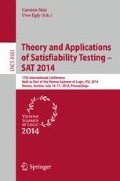Abstract
We implement an online judge for evaluating correctness of reductions between NP-complete problems. The site has a list of exercises asking for a reduction between two given problems. Internally, the reduction is evaluated by means of a set of tests. Each test consists of an input of the first problem and gives rise to an input of the second problem through the reduction. The correctness of the reduction, that is, the preservation of the answer between both problems, is checked by applying additional reductions to SAT and using a state-of-the-art SAT solver. In order to represent the reductions, we have defined a new programming language called REDNP. On one side, REDNP has specific features for describing typical concepts that frequently appear in reductions, like graphs and clauses. On the other side, we impose severe limitations to REDNP in order to avoid malicious submissions, like the ones with an embedded SAT solver.
The authors were supported by an FPU grant (first author) and the FORMALISM project (TIN2007-66523) from the Spanish Ministry of Education and Science.
Access this chapter
Tax calculation will be finalised at checkout
Purchases are for personal use only
Preview
Unable to display preview. Download preview PDF.
References
Khan, S.: Khan Academy (2006), http://www.khanacademy.org
Ng, A., Koller, D.: Coursera (2012), http://www.coursera.org
Thrun, S., Stavens, D., Sokolsky, M.: Udacity (2012), http://www.udacity.com
Agarwal, A.: edX (2012), http://www.edx.org
García, C., Revilla, M.A.: UVa online judge (1997), http://uva.onlinejudge.org
Hughes, J.: TopCoder (2000), http://www.topcoder.com
Mirzayanov, M.: Codeforces (2010), http://www.codeforces.com
Hopcroft, J.E., Motwani, R., Ullman, J.D.: Introduction to Automata Theory, Languages, and Computation, 3rd edn. Addison-Wesley (2006)
Garey, M.R., Johnson, D.S.: Computers and Intractability: A Guide to the Theory of NP-Completeness. W. H. Freeman & Co., New York (1979)
Skyum, S., Valiant, L.G.: A complexity theory based on boolean algebra. Journal of the ACM 32(2), 484–502 (1985)
Sörensson, N., Eén, N.: MiniSat 2.1 and MiniSat++ 1.0. Tech. rep., SAT Race 2008 Editions (2008)
Biere, A.: PicoSAT essentials. Journal on Satisfiability, Boolean Modeling and Computation 4(2-4), 75–97 (2008)
Author information
Authors and Affiliations
Editor information
Editors and Affiliations
Rights and permissions
Copyright information
© 2014 Springer International Publishing Switzerland
About this paper
Cite this paper
Creus, C., Fernández, P., Godoy, G. (2014). Automatic Evaluation of Reductions between NP-Complete Problems. In: Sinz, C., Egly, U. (eds) Theory and Applications of Satisfiability Testing – SAT 2014. SAT 2014. Lecture Notes in Computer Science, vol 8561. Springer, Cham. https://doi.org/10.1007/978-3-319-09284-3_30
Download citation
DOI: https://doi.org/10.1007/978-3-319-09284-3_30
Publisher Name: Springer, Cham
Print ISBN: 978-3-319-09283-6
Online ISBN: 978-3-319-09284-3
eBook Packages: Computer ScienceComputer Science (R0)

